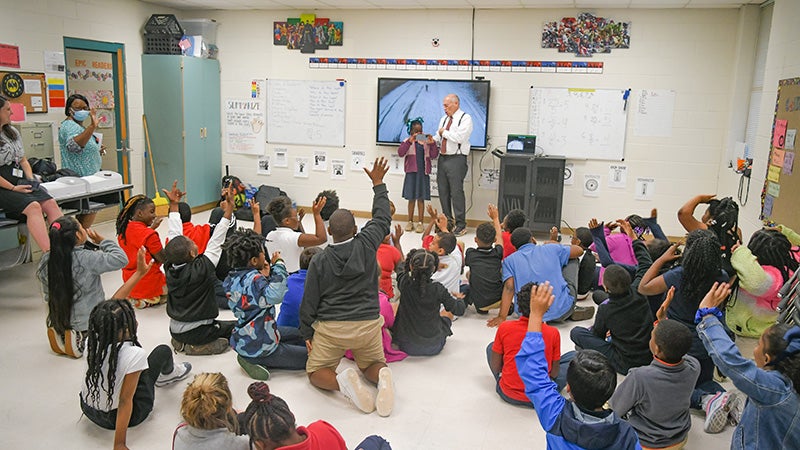On anniversary of Alabama tornado outbreak, James Spann speaks at two Chambers Co. schools
Published 3:46 pm Thursday, April 27, 2023
|
Getting your Trinity Audio player ready...
|
Twelve years ago Thursday was undoubtedly one of the busiest and most unforgettable of James Spann’s longtime career as a meteorologist in Alabama.
If you lived in Alabama back then, then you know that April 27, 2011, is a day that will live in infamy in state history.
For Spann, in a career of covering weather of all kinds, it was a day of severe storms like no other. He was on the air on ABC 33/40 in Birmingham all day covering tornadic storms, with the worst being a EF-4 tornado that hit the city of Tuscaloosa before traveling into the Birmingham metro area.
He said, looking back, he knew the storms that day had caused a lot of damage, but big picture-wise, he was so busy covering live radar information that he didn’t immediately recognize the significance of a once or twice-in-a-lifetime type weather event.
In a way, he’s glad he couldn’t immediately grapple with the emotions of it.
“I didn’t want to experience that day emotionally. When you’re in the middle of it, you’ve got so much traffic you’re dealing with, all these livestreams, chat sessions and traffic coming in, and every CPU cycle in my brain had to be used to tell a coherent story,” Spann said. “It probably didn’t hit me until two or three days later than we’d just lived through Alabama history.”
More than 240 people that died that day, with Alabama alone having 62 tornadoes.
Spann said the death toll weighed on him for months later.
“I didn’t talk about it for six months,” Spann said. “The warnings were timely. In some cases, people had 40 minutes to get to a safe place, yet the death toll was 252, which is absolutely inexcusable for me or anyone in the weather enterprise. I had to go through the grieving process. You go through depression and anger and all these phases, and I did. Six months after is when I pepped up and said ‘let’s fix it.’”
Spann said those sorts of days come around every 40 years. Based on the timeline, he doesn’t expect to cover another day like that in his lifetime. He certainly hopes the state doesn’t experience anything like that for a long time, though he’s asked about it often.
“If there’s one tornado in the whole tornado, whether it’s in Georgia, Alabama or whatever, and it comes down your street, then that’s your April 27,” Spann said. “We don’t want people letting up on their guard, but those kind of days happen once every 40 years.”
Spann had a much happier April 27, 2023, as he visited students at Eastside Elementary and Chambers Academy in LaFayette.
While sharing weather information to hundreds of thousands of people in Birmingham is his day job, Spann will tell you there’s nothing he enjoys more than visiting schools.
Typically, he’s at one to two schools a day, teaching about the weather and hoping to engage students in a discussion about science.
“It energizes me. I feed back on the energy, so when I’m back at work I’m energized,” Spann said. “It’s a win-win. Somebody got me excited about science when I was a kid. The least I could do is do that for another child and teach them some tornado safety.”
Spann said in many cases students lead their families when it comes to understanding weather information. His presentation at both schools included basic explanations of a weather radar, how to identify a tornado, lightning safety, types of clouds and much more.
He knows every student he talked to Thursday isn’t going to be a climatologist or meteorologist, but that’s not the point. But he encouraged them to explore careers in science.
“I want them to know they can be a brilliant scientist, boys and girls,” Spann said. “Growing up here, they will experience the greatest diversity in weather on the planet.”
Spann said there’s probably a child he talked to Thursday that is hurting. He came from a broken home but he and his mom made it, and he wants students to know they can overcome any obstacles they face as well.
“We made it, and they made it, and they’ll be fine,” Spann said. “They need to know there’s a light at the end of the tunnel.”





